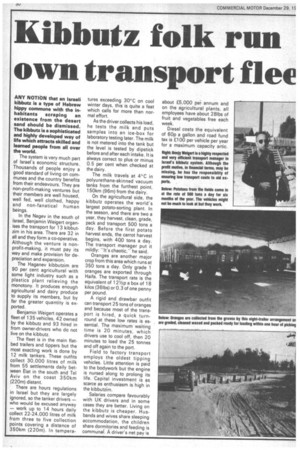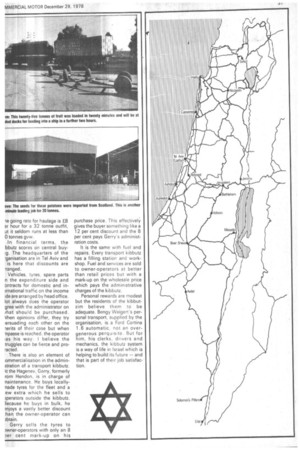Kibbutz folk run own transport flee
Page 32

Page 33

If you've noticed an error in this article please click here to report it so we can fix it.
ANY NOTION that an Israeli kibbutz is a type of Hebrew hippy commune with the inhabitants scraping an existence from the desert ,sand should be dismissed. The kibbutz is a sophisticated and highly developed way of life which attracts skilled and learned people from all over the world.
The system is very much part of Israel's economic structure. Thousands of people enjoy a good standard of living on communes and the country benefits from their endeavours. They are non-profit-making ventures but their members are well housed, well fed, well clothed, happy and non-fanatical human beings.
In the Negev in the south of Israel, Benjamin Weigert organises the transport for 13 kibbutzim in his area. There are 32 in all and they form a co-operative. Although the venture is nonprofit-making, it must pay its way and make provision for depreciation and expansion.
The Haganev kibbutzim are 90 per cent agricultural with some light industry such as a plastics plant relieving the monotony. It produces enough agricultural and dairy produce to supply its members, but by far the greater quantity is exported.
Benjamin Weigert operates a fleet of 135 vehicles, 42 owned by the kibbutz and 93 hired in from owner-drivers who do not live on the kibbutz.
The fleet is in the main flatbed trailers and tippers but the most exacting work is done by 12 milk tankers. These outfits collect 30,000 litres of milk from 55 settlements daily between Elat in the south and Tel Aviv on the coast 350km (220m) distant.
There are hours regulations in Israel but they are largely ignored, so the tanker drivers — who would be excused anyway — work up to 14 hours daily collect 22-24,000 litres of milk from three to five collection points covering a distance of 350km (220m). In tempera tures exceeding 30°C on cool winter days, this is quite a feat which calls for more than normal effort.
As the driver collects his load, he tests the milk and puts samples into an ice-box for laboratory testing later. The milk is not metered into the tank but the level is tested by dipstick before and after each intake. It is always correct to plus or minus 0.5 per cent when checked at the dairy.
The milk travels at 4°C in polyurethane-skinned vacuum tanks from the furthest point, 150km (96m) from the dairy.
On the agricultural side, the kibbutz operates the world's largest potato-sorting plant. In the season, and there are two a year, they harvest, clean, grade, pack and transport 500 tons a day. Before the first potato harvest ends, the carrot harvest begins, with 400 tons a day. The transport manager put it mildly: ''It's chaotic," he said.
Oranges are another major crop from this area which runs at 350 tons a day. Only grade 1 oranges are exported through Haifa. The transport rate is the equivalent of 121/2p a box of 18 kilos (36Ibs) or 0.3 of one penny per pound.
A rigid and drawbar outfit can transport 25 tons of oranges and because most of the transport is hired, a quick turn round at these low rates is essential. The maximum waiting time is 20 minutes, which drivers use to cool off, then 20 minutes to load the 25 tonnes and off again to the port.
Field to factory transport employs the oldest tipping vehicles. Little attention is paid to the bodywork but the engine is nursed along to prolong its life. Capital investment is as scarce as enthusiasm is high in the kibbutzim.
Salaries compare favourably with UK drivers and in some cases they are better. Living on the kibbutz is cheaper. Husbands and wives share sleeping accommodation, the children share dormitories and feeding is communal. A driver's net pay is about £5,000 per annum and on the agricultural plants, all employees have about 28Ibs of fruit and vegetables free each week.
Diesel costs the equivalent of 60p a gallon and road fund tax is £100 per vehicle per year for a maximum capacity artic.
le going rate for haulage is £8 ar hour for a 32 tonne outfit, ut it seldom runs at less than o tonnes gvw.
In fnancial. terms, the bbutz scores on central buylg. The headquarters of the -ganisation are in Tel Aviv and is here that discounts are -ranged.
Vehicles, tyres, spare parts n the expenditure side and ontracts for domestic and inm-lational traffic on the income ide are arranged by head office. lot always does the operator gree with the administrator on /hat should be purchased. Vhen opinions differ, they try iersuading each other on the lerits of their case but when -npasse is reached, the operator las his way. I believe the truggles can be fierce and proracted There is also an element of :ommercialisation in the adminstration of a transport kibbutz. kt the Hagenev, Gerry, formerly rom Hendon, is in charge of naintenance. He buys locallyI-lade tyres for the fleet and a ew extra which he sells to )perators outside the kibbutz. 3ecause he buys in bulk, he ?.njoys a vastly better discount :han the owner-operator can obtain.
Gerry sells the tyres to owner-operators with only an 8 Der cent mark-up on his purchase price. This effectively gives the buyer something like a 12 per cent discount and the 8 per cent pays Gerry's administration costs.
It is the same with fuel and repairs. Every transport kibbutz has a filling station and workshop. Fuel and services are sold to owner-operators at better than retail prices but with a mark-up on the wholesale price which pays t(-le administrative charges of the kibbutz.
Personal rewards are modest but the residents of the kibbutzim believe them to be adequate. Be,ngy Weigert's personal transport, supplied by the organisation, is a Ford Cortina 1.6 automatic, not an overgenerous perquisite. But for him, his clerks, drivers and mechanics, the kibbutz system is a way of life in Israel which is helping to build its future — and that is part of their job satisfaction.




































































